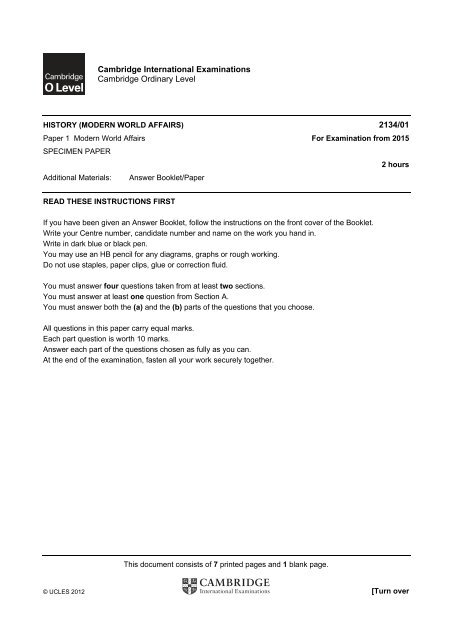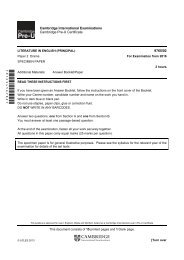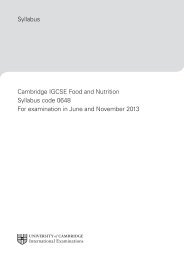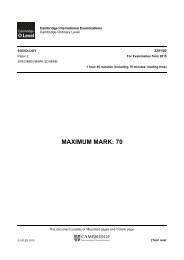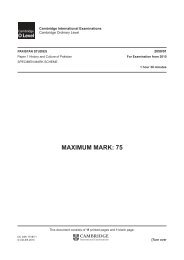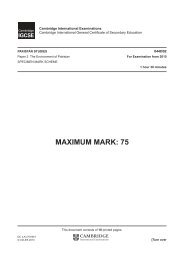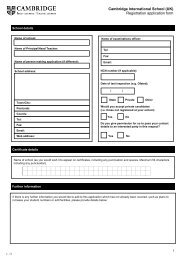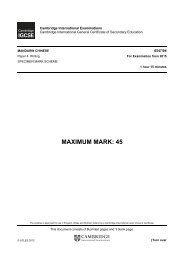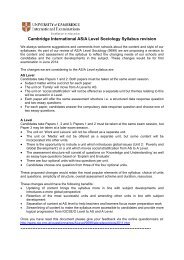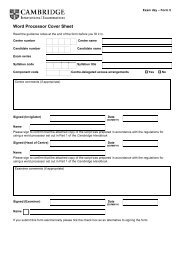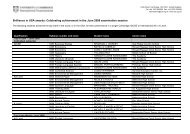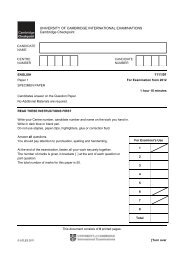2015 Specimen Paper 1 - Cambridge International Examinations
2015 Specimen Paper 1 - Cambridge International Examinations
2015 Specimen Paper 1 - Cambridge International Examinations
You also want an ePaper? Increase the reach of your titles
YUMPU automatically turns print PDFs into web optimized ePapers that Google loves.
<strong>Cambridge</strong> <strong>International</strong> <strong>Examinations</strong><br />
<strong>Cambridge</strong> Ordinary Level<br />
HISTORY (MODERN WORLD AFFAIRS) 2134/01<br />
<strong>Paper</strong> 1 Modern World Affairs For Examination from <strong>2015</strong><br />
SPECIMEN PAPER<br />
2 hours<br />
Additional Materials: Answer Booklet/<strong>Paper</strong><br />
READ THESE INSTRUCTIONS FIRST<br />
If you have been given an Answer Booklet, follow the instructions on the front cover of the Booklet.<br />
Write your Centre number, candidate number and name on the work you hand in.<br />
Write in dark blue or black pen.<br />
You may use an HB pencil for any diagrams, graphs or rough working.<br />
Do not use staples, paper clips, glue or correction fluid.<br />
You must answer four questions taken from at least two sections.<br />
You must answer at least one question from Section A.<br />
You must answer both the (a) and the (b) parts of the questions that you choose.<br />
All questions in this paper carry equal marks.<br />
Each part question is worth 10 marks.<br />
Answer each part of the questions chosen as fully as you can.<br />
At the end of the examination, fasten all your work securely together.<br />
This document consists of 7 printed pages and 1 blank page.<br />
© UCLES 2012 [Turn over
2<br />
Section A<br />
<strong>International</strong> Relations and Developments<br />
You must answer at least one question from this section.<br />
1 (a) What were the aims of Woodrow Wilson for the peace negotiations at the end of the First<br />
World War? [10]<br />
(b) To what extent did the Treaty of Versailles satisfy Georges Clemenceau? Explain your<br />
answer. [10]<br />
2 (a) Describe the events of the Manchurian Crisis, 1931–33. [10]<br />
(b) Was the failure of sanctions the main reason for the League of Nations failing to stop the<br />
invasion of Abyssinia in 1935–36? Explain your answer. [10]<br />
3 (a) What was meant by ‘Total War’ in the years 1939–45? [10]<br />
(b) How far was the failure of Operation Barbarossa responsible for Germany’s defeat in the<br />
Second World War? Explain your answer. [10]<br />
4 (a) Describe the tactics used by the American military in Vietnam in the years 1965–73. [10]<br />
(b) ‘Kennedy should be given more credit than Khrushchev for resolving the Cuban Missile<br />
Crisis.’ How far do you agree with this statement? Explain your answer. [10]<br />
5 (a) Describe the main events of the First Gulf War, 1990–91. [10]<br />
(b) To what extent was the First Gulf War caused by economic factors? Explain your answer.<br />
[10]<br />
© UCLES 2012 2134/01/SP/15
3<br />
Section B<br />
Western Europe<br />
6 (a) Describe the uprisings against the government in Germany in 1919–20. [10]<br />
(b) How important was Gustav Stresemann for Germany’s recovery during the years 1923–29?<br />
Explain your answer. [10]<br />
7 (a) How did Benito Mussolini rise to power in Italy in 1919–22? [10]<br />
(b) How effectively did Mussolini rule Italy between 1922 and 1938? Explain your answer. [10]<br />
8 (a) Describe how Spain had become a divided country by 1936. [10]<br />
(b) How important was international support to the success of General Franco in the Spanish<br />
Civil War, 1936–39? Explain your answer. [10]<br />
9 (a) What happened during the British General Strike in 1926? [10]<br />
(b) ‘The British people were fully behind the war effort during the Second World War.’ How far do<br />
you agree? Explain your answer. [10]<br />
10 (a) What structures were established by the Maastricht Treaty? [10]<br />
(b) How successful has the Maastricht Treaty been since 1991? Explain your answer. [10]<br />
© UCLES 2012 2134/01/SP/15 [Turn over
4<br />
Section C<br />
The Americas<br />
11 (a) What was the ‘Red Scare’ in 1919–20 in the USA? [10]<br />
(b) How far did Americans benefit from the economic boom in the 1920s? Explain your answer.<br />
[10]<br />
12 (a) How did President Hoover respond to the Wall Street Crash? [10]<br />
(b) ‘The rich were more affected than the poor by the Great Depression.’ How far do you agree?<br />
Explain your answer. [10]<br />
13 (a) What was the Watergate Scandal? [10]<br />
(b) How successful were President Reagan’s economic policies? Explain your answer. [10]<br />
14 (a) Describe the contribution of Rosa Parks to the civil rights struggle in the USA. [10]<br />
(b) ‘Martin Luther King deserves the most credit for bringing about improvements to civil rights in<br />
the USA.’ How far do you agree? Explain your answer. [10]<br />
15 (a) Describe the rule of President Batista in Cuba. [10]<br />
(b) How far did the lives of the people in Cuba improve under the rule of Fidel Castro? Explain<br />
your answer. [10]<br />
© UCLES 2012 2134/01/SP/15
5<br />
Section D<br />
The Soviet Union and Eastern Europe<br />
16 (a) Describe the New Economic Policy introduced in the Soviet Union in 1921. [10]<br />
(b) How successful were Stalin’s Five-Year Plans in modernising the Soviet Union, 1928–37?<br />
Explain your answer. [10]<br />
17 (a) What was the ‘cult of personality’ under Stalin? [10]<br />
(b) Early in the Great Patriotic War, Stalin ordered heavy industries to be moved to the east of<br />
the country. How important was this for the survival of the USSR? Explain your answer. [10]<br />
18 (a) Describe how Khrushchev rose to power in Russia in 1953–56. [10]<br />
(b) How far did Khrushchev reform the Soviet Union? Explain your answer. [10]<br />
19 (a) What was Glasnost? [10]<br />
(b) ‘The policy of Perestroika was the most important reason for the collapse of the Soviet<br />
economy under Gorbachev.’ How far do you agree? Explain your answer. [10]<br />
20 (a) Describe the events of the Hungarian Uprising of 1956. [10]<br />
(b) To what extent was spreading communism the reason for the USSR taking over Eastern<br />
Europe in the years 1944–48? Explain your answer. [10]<br />
© UCLES 2012 2134/01/SP/15 [Turn over
6<br />
Section E<br />
Africa and the Middle East<br />
21 (a) What were the Mau Mau Campaigns? [10]<br />
(b) To what extent was the election of de Gaulle as President of France the reason for the<br />
granting of independence to Algeria? Explain your answer. [10]<br />
22 (a) Describe the student uprisings in South Africa in the 1970s. [10]<br />
(b) How important was de Klerk’s speech to Parliament on 2 February 1990 in bringing about the<br />
end of apartheid? Explain your answer. [10]<br />
23 (a) Describe Britain’s involvement in making arrangements for the future of Palestine, 1917–22.<br />
[10]<br />
(b) How far was the United Nations’ 1947 Partition Plan the result of mass Jewish immigration<br />
into Palestine? Explain your answer. [10]<br />
24 (a) Describe the Intifada, 1987–88. [10]<br />
(b) How successful were the Oslo Accords in bringing about peace in the Middle East in the<br />
period up to 2006? Explain your answer. [10]<br />
25 (a) Describe the Iranian Revolution of 1979. [10]<br />
(b) How far was the Arab League a force for peace in the years 2002–10? Explain your answer.<br />
[10]<br />
© UCLES 2012 2134/01/SP/15
7<br />
Section F<br />
Asia<br />
26 (a) What was the Fourth of May Movement in China? [10]<br />
(b) To what extent was the Long March a success for the Red Army? Explain your answer. [10]<br />
27 (a) Describe how Deng Xiaoping rose to power after the death of Mao Zedong. [10]<br />
(b) To what extent were the changes to agricultural policy in China in the 1980s responsible for<br />
the strengthened economy of that decade? Explain your answer. [10]<br />
28 (a) Describe the impact of the First World War on Japan up to 1920. [10]<br />
(b) How far can the rise of the military in the Japanese government in the inter-war years be<br />
explained by economic factors? Explain your answer. [10]<br />
29 (a) What happened to Kashmir in 1947–48? [10]<br />
(b) How important was Mukti Bahini in the creation of Bangladesh in 1971? Explain your answer.<br />
[10]<br />
30 (a) Describe how Indonesia became a republic after the Second World War. [10]<br />
(b) How important were the Five Principles of the national struggle (Pancasila) in guiding<br />
Sukarno’s rule of Indonesia? Explain your answer. [10]<br />
© UCLES 2012 2134/01/SP/15
8<br />
BLANK PAGE<br />
Permission to reproduce items where third-party owned material protected by copyright is included has been sought and cleared where possible. Every<br />
reasonable effort has been made by the publisher (UCLES) to trace copyright holders, but if any items requiring clearance have unwittingly been included, the<br />
publisher will be pleased to make amends at the earliest possible opportunity.<br />
<strong>Cambridge</strong> <strong>International</strong> <strong>Examinations</strong> is part of the <strong>Cambridge</strong> Assessment Group. <strong>Cambridge</strong> Assessment is the brand name of University of <strong>Cambridge</strong> Local<br />
<strong>Examinations</strong> Syndicate (UCLES), which is itself a department of the University of <strong>Cambridge</strong>.<br />
© UCLES 2012 2134/01/SP/15


